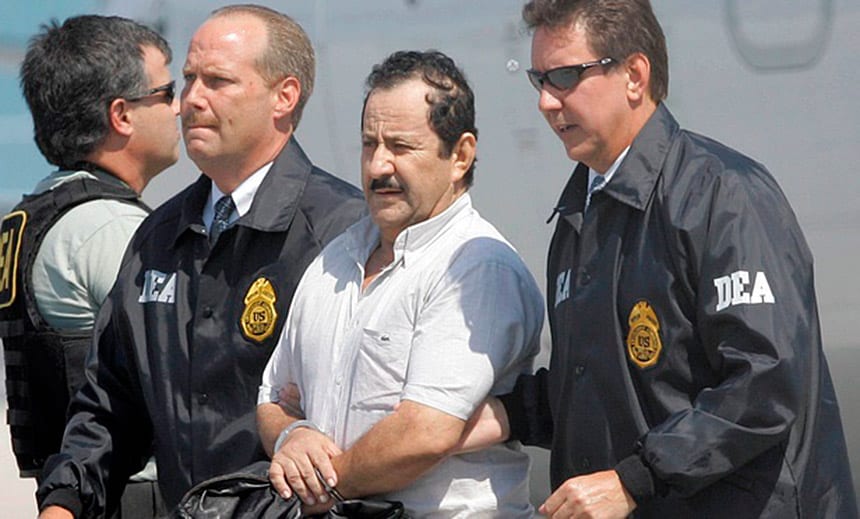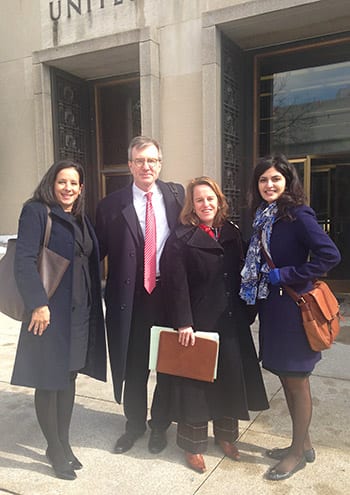
By Andrew Cohen
Tenacity, perseverance, and deft legal maneuvering enabled the International Human Rights Law Clinic (IHRLC) to celebrate a major victory this week. On March 14—after a six-year court battle—a federal judge granted victims of Colombian paramilitary leader Hernan Giraldo Serna the right to participate in the accused’s criminal proceedings.
In 2008, Giraldo Serna was one of 14 Colombian warlords extradited to the United States to face drug trafficking charges. The clinic teamed with the law firm Wilson Sonsini Goodrich & Rosati to represent the victims, who seek justice for egregious human rights crimes Giraldo Serna committed during the course of his drug trade.
“This is a rare acknowledgement by a U.S. court of the human cost of Colombia’s drug war,” said assistant clinical professor of law Roxanna Altholz ’99, IHRLC’s associate director and co-counsel on the case.
The clinic’s clients are the widow and daughter of Julio Henríquez, who directed a Colombian NGO that trained farmers to grow legal crops instead of coca, cocaine’s main ingredient. Giraldo Serna was convicted in Colombia for the 2001 disappearance and murder of Henríquez, who had opposed coca growing in an area under Giraldo Serna’s control. Henríquez’s body was found six years later.
Giraldo Serna admitted that over the course of four decades, he was responsible for torturing, murdering, and forcibly displacing thousands of people. Before serving jail time for those crimes, he was extradited from Colombia to the United States.

In the U.S. federal drug case against Giraldo Serna, Henríquez’s family wanted to be declared as victims of the drug conspiracy, which would allow them to participate in the case under the federal Crime Victims’ Rights Act. Enacted in 2004, the law ensures certain rights to victims—including the right to testify at sentencing, meet with prosecutors, and seek restitution.
New hope for victims’ families
With this week’s ruling by U.S. District Court Judge Reggie Walton, Henríquez’s widow and daughter are cleared to testify at Giraldo Serna’s sentencing hearing on May 14. “The trial court ruling has persuasive value and this decision expands the universe of what is possible,” Altholz said.
Walton initially ruled against the family in August 2015, stating that the circumstances of Henríquez’s death were too removed from Giraldo Serna’s drug conspiracy. Altholz’s legal team appealed, however, and convinced the U.S. Court of Appeals for the D.C. Circuit that Walton was too restrictive in his application of the Crime Victims’ Rights Act. In reviewing the case under a broader standard, Walton ruled in favor of granting the family victim status.
The U.S. Department of Justice (DOJ) opposed the family’s request for victim status—which still baffles Altholz. “There is no question that Giraldo Serna used violence and force to further the drug conspiracy,” she said. “Yet, the department claimed we had not proven that the victim was killed because of the conspiracy. The judge disagreed.”
Clinic students have worked under Altholz’s supervision on this matter since 2010, when they released a revealing report about the extent of human rights transgressions committed by Colombian warlords extradited to the United States. Last semester, students Lydia Sinkus ’17 and Natalie Schultheis ’17 worked on a sentencing submission for the case. It provides a fuller accounting of Giraldo Serna’s extensive criminal history in Colombia than what the DOJ appears to have made available, and describes the harm suffered by the Henríquez family.
“Our clients will be the first Colombian victims heard by any U.S. judge about the human consequences of drug conspiracies,” Altholz said. “They’re eager to find out what impact their participation will have at sentencing, and they’re optimistic about the opportunities this decision creates.”